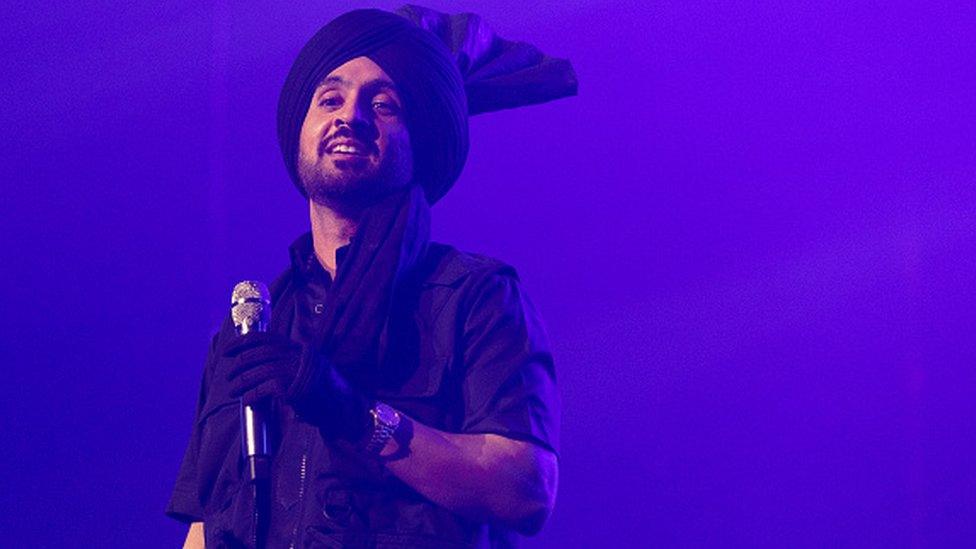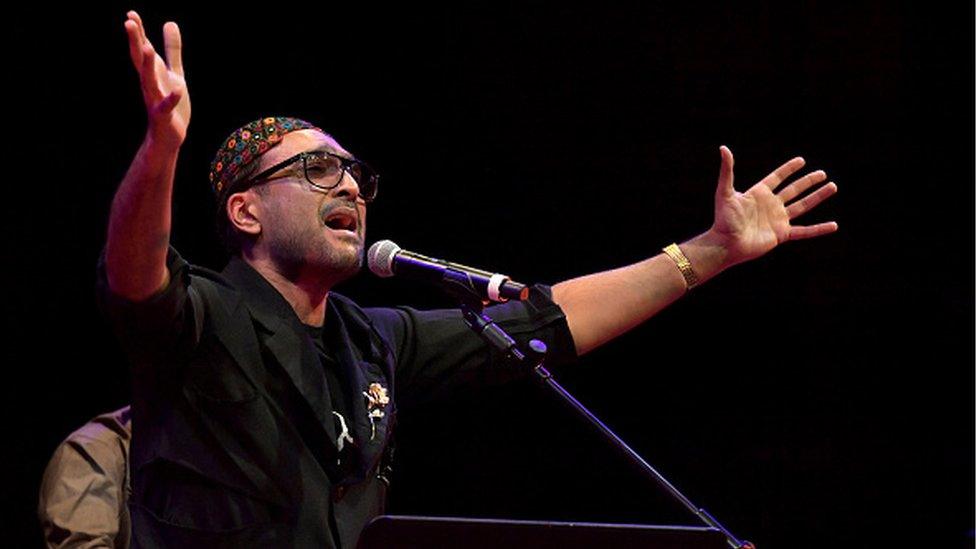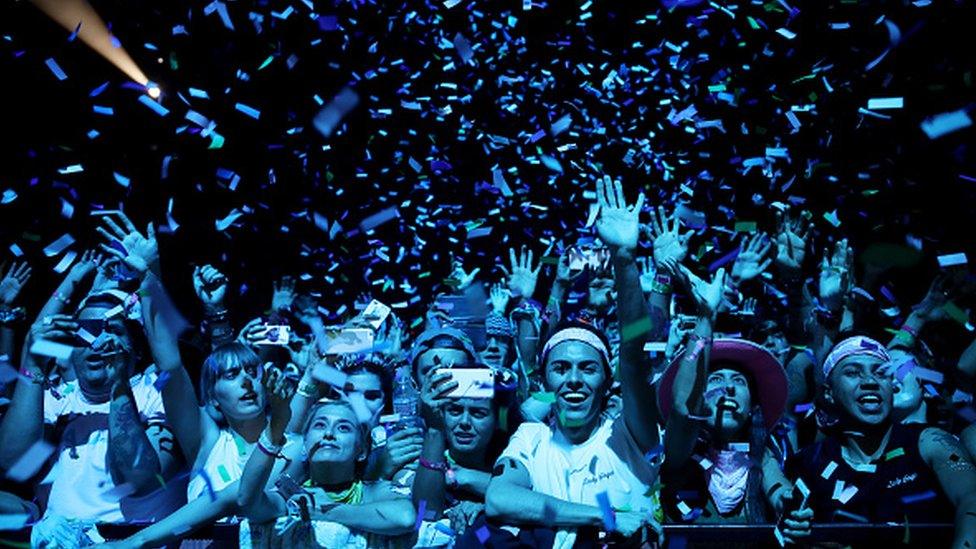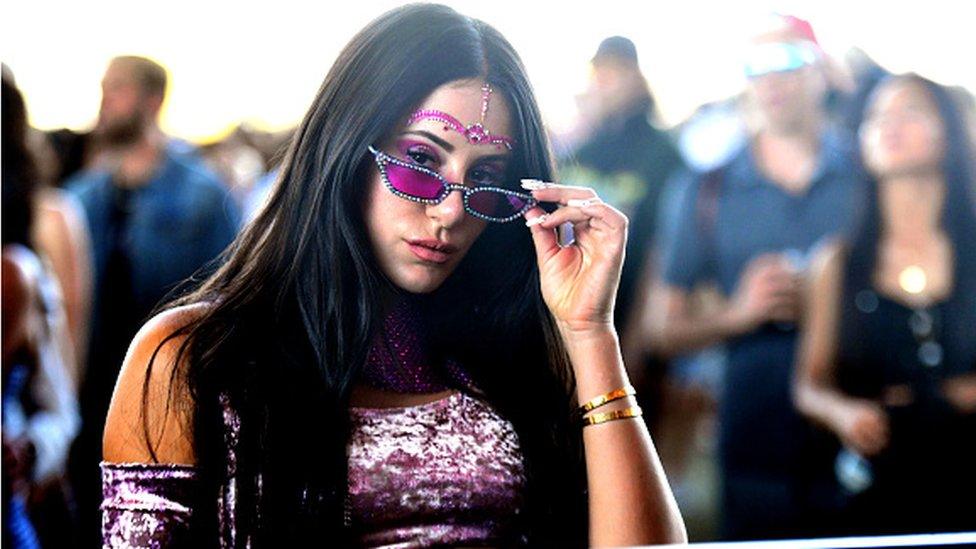Diljit Dosanjh and Ali Sethi: South Asian stars take over US festival
- Published

Diljit Singh Dosanjh will be the first Punjabi language singer to perform at the festival
South Asian music fans are flocking to Coachella this year as it offers blockbuster attractions from the community.
The Coachella Valley Music & Arts Festival, among the most profitable music events in the world, takes place over two consecutive weekends every April in Indio, California.
This year, Indian singer and actor Diljit Singh Dosanjh and Pakistani singer and composer Ali Sethi are among South Asian acts debuting at the festival as they perform alongside international acts like BLACKPINK, Kid Laroi, Charli XCX, Labrinth, Jai Wolf, Joy Crookes, Jai Paul, Frank Ocean and Underworld.
Sethi's Pasoori was the most searched song of 2022 on Google. Dosanjh, hugely popular among the Indian diaspora worldwide, will be the first Punjabi language singer to perform at the festival.
Last year's lineup also included South Asian artists like Raveena Aurora and Arooj Aftab, but the elevated profiles of this year's performers makes it a huge moment for fans.
"If there was going to be a time to go to this festival, it was now. This is the year," Brooklyn resident Gauree Patel says.
Growing up in Texas, Garima Singh could never have imagined a "South Asian artist at a prominent American music festival". She will be at Coachella this year with six South Asian friends from different parts of country to "hear, see and dance along" with Dosanjh who they consider "one of their own".

Ali Sethi's Pasoori was the most searched song of 2022 on Google
"Who hasn't heard his music! I am excited about South Asian headliners, it's crazy!" she says.
The diversity and "brown inclusivity" at Coachella is appealing to fans of South Asian artists who see it as an opportunity to "experience joy" like other Americans.
Ms Patel says a dozen of her friends chatted about "our community" being at Coachella and felt a sense of affinity.
"Music festivals allow white people to experience joy, connect with each other, centring their experience," Ms Patel says. "This is what it will mean for us South Asians. We too will have the experience of being centred at Coachella."
South Asian singers and film stars frequently tour North American venues thronged by their fans.
Radhika Kalra has attended multiple concerts by Dosanjh in the US and Canada but says she "can't miss him on such a huge stage".
"It's about time they get this stage," she says.
A trained dancer, Ms Kalra plans to have nine friends - all South Asian girls from New York - "practice a few steps to the Diljit song Black & White" for the festival.
For the South Asians who grew up in North America listening to Bollywood and other South Asian film songs, this is a milestone nod to their culture.

Fans say the line-up this year is a huge moment for South Asia music fans
So, not attending Coachella was simply not an option for Denver-based Deep Singh Badhesha and Harshwinder Kaur Badhesha. The couple bought their tickets "as soon as the announcement popped up" on their computer.
Their tweet about the booking got a response from the star himself.
"I hope Diljit sings Born to Shine, GOAT, Vibe and 5 Taara," says Mr Badesha.
Immigrant parents of second-generation South Asians are supportive of the journeys as their children embrace the music with ties to their heritage.
Sarina Singh, who describes herself as a "huge Diljit fan" was torn about taking the Coachella trip with her husband Simranjeet Singh Bedi, as she is seven months pregnant.
Her mother decided to fly from Pennsylvania to Colorado to take care of the couple's two-year-old daughter, allowing them "their baby moon", a little trip before their baby arrives.
"My mom said we should celebrate. I never had any interest in going to Coachella but I am going for Diljit!" Ms Singh says.
Music and fashion go hand in hand at Coachella. Fans whose daily playlists include Dosanjh and Sethi, are getting fashion ready. Ms Kalra plans to wear an anodized silver necklace with coins on it she bought from India over a white crop top with jean shorts for a "typical Coachella boho look".

Fans say they are having an 'conversation' about cultural appropriation in festival outfits
Garima Singh says she got her nails done in a henna motif to go with her Indo-western attire.
As fans accessorise their looks, they are mindful of the cultural appropriation linked to American festivals, like the usage of henna tattoos and bindis that originate from South Asian culture.
Fans say its brought up a conversation about how one shows up at the festival as young South Asians try to reclaim their culture.
"So much of [the] music festival style [here] has been appropriated from Indian culture," Garima Singh says, with jewellery like anklets and nose rings.
Neha Assar, a popular Los Angeles area artist, is used to drawing intricate henna designs on festival goers.
"People want to show off their bodies and henna has become a universal accessory to go with outfits at Coachella," she says. "The reason is to tap into the 'bohemian' look. But henna is Indian for me, not bohemian!".
Fans hope this year's festival helps non-South Asians understand the community and its culture better.
"I hope people will listen to more South Asian music after this," says Ania Ahsan, a Pakistani-origin fan.
BBC News India is now on YouTube. Click here, external to subscribe and watch our documentaries, explainers and features.

Read more India stories from the BBC:
